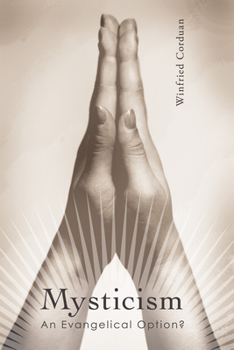Mysticism
Select Format
Select Condition 
Book Overview
Mysticism is a controversial topic that all too frequently receives one-sided coverage. On the one hand there are many enthusiasts who are willing to defend mysticism at almost any cost, including sacrificing logical and theological integrity. On the other hand there are philosophers and theologians who see mysticism as not much more than an evil to be stamped out. This book takes a careful look at the philosophical and theological questions involved and attempts to locate a modest place for mysticism within a genuine evangelical framework. Questions addressed in this book include such matters as: Is mysticism a perennial philosophy that appears in different guises but is always the same underneath? Can we argue for an objective reality behind all mystical experience? How can we understand the fact that mystics talk about something that they say is beyond language? How has mysticism shown up in various Christian traditions? Can we reconcile mysticism with the New Testament? The conclusion of this book is based on an understanding of mysticism as an unmediated link to an absolute. In that sense there is a form of mysticism taught in the New Testament, but it is a mysticism that does not require ecstatic experience and does not constitute a separate source of revelation. Nevertheless, this New Testament mysticism describes an integral part of biblical spirituality.
Format:Paperback
Language:English
ISBN:1606088394
ISBN13:9781606088395
Release Date:July 2009
Publisher:Wipf & Stock Publishers
Length:150 Pages
Weight:0.40 lbs.
Dimensions:0.4" x 5.4" x 8.0"
Customer Reviews
1 rating
A Careful & Balanced Analysis of Mysticism
Published by Thriftbooks.com User , 24 years ago
Unlike Arthur Johnson's lopsided approach in "Faith Misguided: Exposing the Dangers of Mysticism" (Moody Press, 1988), Corduan offers a balanced, modest approach to the topic. He is aware of the complex, multi-dimensional nature of the subject and carefully looks at the various positions within the literary field. In his personal introduction (Chapter One), he states his theological and methodological presuppositions which include his commitment to Evangelical Christianity and biblical inerrancy. He states: "Ultimately, a mystical experience may not be the standard for evaluating truth in the Bible, but the Bible must remain the standard by which personal realities and experiences are tested" (pg. 17). Corduan also wisely points out the need to presuppose that the best authority on the phenomena of mysticism are mystics themselves and any critical analysis of mystical experience has to be based on interpretations because "the pure phenomenality of the experienced has to go unassailed" (pg. 19). Chapter Two addresses the question "What is Mysticism?" He acknowledges that this is no easy task because "many definitions will tend to be so specific as to say too much or so general as to say too little" (pg. 22). After critiquing various definitions, he settles for an understanding of mysticism as "an unmediated link to an absolute." Chapter Three answers the question of "Does Mysticism Have a Common Core?" by siding with neither the advocates of unanimity (The Perennial Philosophy) nor the advocates of an extreme pluralism. Instead, he takes a Thomistic approach which holds that some mystical experiences across various religious and philosophical backgrounds can be similar. (One is reminded of Aquinas' distinction between univocal, equivocal, and analogical language.) Chapter Four asks, "Does Mysticism Have an Objective Referent?". Within this chapter, Corduan basically explores the subjective and objective aspects of mysticism and points out that the question of truth can't be settled within a given experience without looking at the whole frame of reference (the world view). Because Corduan is a committed Christian, he admits, for example, that his rejection of Hinduism as a religion leads him to reject the experience contained therein (pg. 75). This, again, takes us back to the distinction between an experience and its interpretation. Because one can experience deception, tests for truth are important and contradictory world views cannot all be true. Having made this point, Corduan adds his theory of a natural mystical faculty within humans that can be activated either purely subjectively or by objective causes. Chapter Five asks, "Can Language Describe Mystical Experience?" Because William James and others posit ineffability as a key characteristic of mystical experience, Corduan looks at this factor in relation to apophatic language. He analyzes the reasons (theories) given by advocates of in





